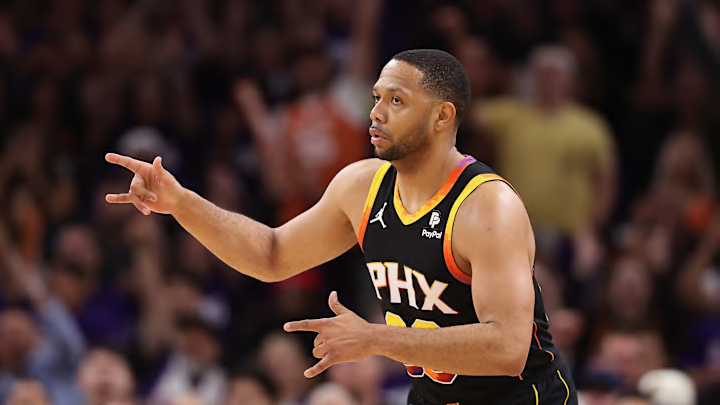Due to the then newly implemented CBA, the Phoenix Suns entered last offseason only being allowed to sign free agents to minimum salaries. With so many open roster spots, those signings took on a huge amount of importance for the team.
Unfortunately nearly every one of them was massive failure, leading to half of them getting sent out in the Royce O’Neale trade after they lost their rotation spots. Of the players who remained, only Eric Gordon received consistent playing time throughout the season.
In 68 regular season games, Gordon averaged 11/1.8/2.0 on 58% true shooting. He played a bigger role than probably anticipated, averaging 27.8 minutes per game and also starting 24 games due to various injuries. His counting stats were down a bit from recent years, while his efficiency rose slightly.
His value, as has been the case for the most of his career, came primarily from his 3-point shooting, which he hit at a 37% clip.
His 5.8 3-point attempts per game were third on the team, and especially vital considering how much the Suns struggled to get up 3s collectively. Gordon’s ability to hit from far behind the 3-point line provided a ton of spacing for the Suns’ stars to operate, as well as a late shot clock outlet for them.
Aside from his floor spacing, Gordon’s ability to put the ball on the floor was also impressive. He averaged the fifth most drives per game on the team, and although he didn’t pick up many assists doing that, it made him much less one dimensional.
Eric Gordon on the Suns' identity this season: "It's been just up and down the roller coaster. Sometimes we've found our will to propel a lot of things, but like I said, at this point, our identity is use what we have, personnel-wise, and that's: We gotta score the ball." pic.twitter.com/MABgor3RyN
— PHNX Suns (@PHNX_Suns) April 27, 2024
Gordon’s lack of assists in general was a tough pill to swallow considering he was the only playable backup guard for most of the year, but that’s never been Gordon’s game. He wisely wasn't forced into that kind of playmaking duty, and was undoubtedly more comfortable because of it.
His streakiness, on the other hand, is more ingrained in his game due to the nature of his role. He would have some games where he’d hit 5 or 6 threes and play a huge part in a Suns' victory, and others where he went completely cold and compounded it by committing mind-boggling turnovers.
His inability to contribute elsewhere on the floor made those games even worse and resulted in shorter stints, which wasn't ideal with the Suns as shallow as they were.
That shallowness ensured that Gordon would see big minutes in the playoffs and, like every other Sun, he had a tough series against Minnesota as his numbers dipped across the board. He did have a better excuse than everyone else though. At 6’2, playing against the long Minnesota wings and paint protectors made it a terrible matchup for him.
He was also thrust into a larger role due to Grayson Allen’s injury, making Gordon the lone floor spacer. He still managed to excel in that facet of the game though, and the one number that did go up was his 3-point percentage, which was 41% in those four games.
Gordon's performance from deep throughout the year made it a great season for him. It was the primary reason he was signed, and he delivered on it more often than not. When factoring in his contract, it’s arguable that no one on the Suns provided more bang for their buck this season. Likewise, no other supporting player on the team fulfilled their role to a tee more than he did.
Getting that kind of assurance from a minimum contract is invaluable, even if the rest of roster’s shortcomings made his deficiencies look worse. With the Suns having to dip back into the minimum contract pool this offseason, re-signing Gordon to another one will be a top priority.
Final Grade: B+
